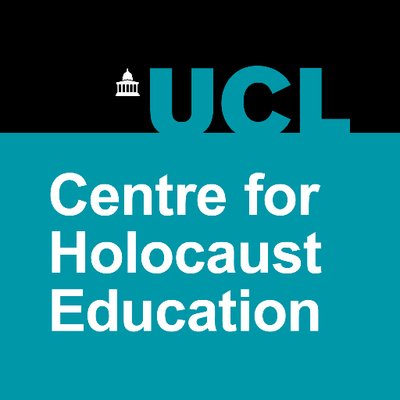Centre for Holocaust Education, Institute of Education, University of London
The Centre has had a major and significant impact on how the Holocaust is taught and understood in educational settings in the UK and beyond.
In recognition of the Centre’s academic profile at national and international scale, Centre staff sit on a number of advisory boards:
- United Kingdom Holocaust Memorial Foundation (UKHMF)
- Imperial War Museum
- Pears Institute for the Study of Antisemitism based at Birkbeck University, University of London
- UNESCO and the Georg Eckert Institute for International Textbooks Research
- Steering Committee of the International Holocaust Remembrance Alliance (IHRA)
- Claims Conference Professional Advisory Board, and providing advice and recommendations on funding applications from around the world
- Holocaust Heritage and Learning Centre (HHLC).
Members of the team have also:
- Served on the Editorial Board for Holocaust Studies: A Journal of Culture and History
- Served as Scholar in Residence at the United States Holocaust Memorial Museum
- Delivered keynote lectures, workshops and paper presentations at a number of academic and practitioner conferences including the British Educational Research Association and the American Educational Research Association, the Historical Association, Schools History Project and the Association of Holocaust Organisations
- Been recognised in the New Year Honours 2017 list: Dr Nicola Wetherall was awarded an MBE recognising her services to Holocaust Education, Genocide Prevention and Human Rights Education. Nicola also serves on the Advisory Board for the Educators Institute of Human Rights (EIHR) and has recently been appointed to the Education Advisory Board of Genocide Watch.
Background
The initial phase of the IOE’s work in Holocaust education produced the first ever national study of teachers’ aims and challenges:
Before designing our support for schools, we wanted to find out more about what was already happening in classrooms across the country and to listen to teachers about their experiences, needs and challenges. This landmark study explored when, where how and why the Holocaust is taught in state-maintained secondary schools in England.
The researchers employed a mixed methodology with an online survey completed by 2,108 teachers and follow-up qualitative interviews with 68 teachers in 24 schools.



 NOA is co-funded by the Rights, Equality and Citizenship Programme (2014-2020) of the European Union
NOA is co-funded by the Rights, Equality and Citizenship Programme (2014-2020) of the European Union